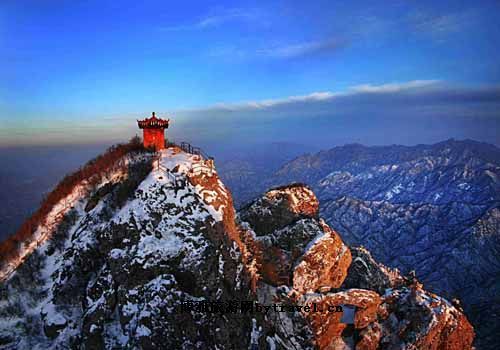Funiu Mountain Geopark holds key to China's past

[Photo from nyljw.com]
Chinese continent's origins lie beneath the Funiu Mountain National Geopark in Henan Province.
The geopark holds a key geological position where the North China Plate and the Yangtze Plate collided and amalgamated about 2.8 billion years ago.
As a result, the geopark keeps a complete and systematic record of all orogenic movement in Central China, beginning from the Archeozoic Period, which has great value in geological research.
The important orogenic movement formed the spinal column of today's Chinese continent, considered to be the Qinling Mountains.
Everywhere in the Funiu Mountain Geopark are relics of the orogenic movement, found in the form of various kinds of granite rocks.
Located in Nanyang, a city in the southwest of Central China's Henan Province, the geopark covers an area of 954 square kilometres.
The Karst landform and erosion landform, characterized by numerous caves and waterfalls, offer a scenic view for visitors.
Funiu Mountain, running from west to east, is part of the East Qinling Mountains and forms a natural borderline between China's north subtropical zone and warm temperate zone.
It boasts well-preserved vegetation, and has a forest coverage of 88 per cent. Due to its special location, the mountain is home to abundant and diverse botanic species, including deciduous broadleaved trees and evergreen broadleaved trees.
The area also hosts more than 50 endangered animal species on the national protection list, such as musk deer, leopards and giant salamanders.
Funiu Mountain is a significant source region to several major branches of the Yangtze River, the Yellow River and the Huaihe River.
The geopark is on the southern piedmont of the Funiu Mountain, with a geological relics protection area of 337.56 square kilometres.
The park's biggest attraction is most certainly its countless dinosaur egg fossils. There have been 13 kinds of dinosaur eggs identified in the area thus far.
In the famous Xixia dinosaur egg fossil coenosis, scientists have found a type of dinosaur eggs unique in the world: the cylindrical dinosaur eggs (Longiteresoolithus xixiaensis).
The great number of dinosaur egg fossils proves the area was once an important habitat for dinosaurs.
Most of the dinosaur eggs belong to the late Cretaceous Period and are essential to the study of dinosaurs' lifestyle and the unknown disaster that brought about their extinction.
The Ministry of Land and Resources approved the Funiu Mountain National Geopark in January 2004.
In October 2005, the Funiu Mountain Geopark came out first in the examination and appraisal conference in Beijing to select China's candidates for world geoparks.
The success means the Funiu Geopark is qualified for receiving examination from the United Nations Educational, Scientific and Cultural Organization (UNESCO).
